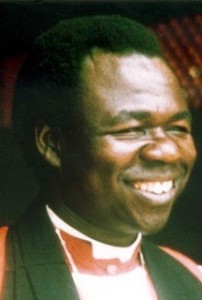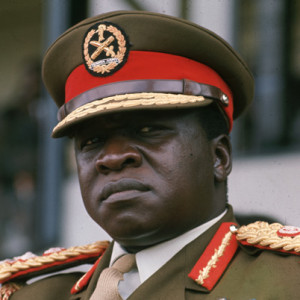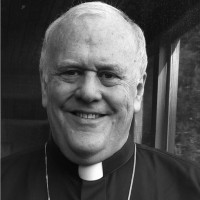Source: AAC International Update
The following article by Bishop Bill Atwood first appeared in the July 23, 2013 edition of the AAC’s International Update. Sign up for this free email here.
Following the British Colonial presence in Uganda, in 1971 a Ugandan general named Idi Amin emerged as a horrible, despotic leader. He dominated Uganda with a ruthless, iron hand. Any opposition was met with violence. Countless people were slaughtered. In the midst of this, in 1977 the Archbishop Janani Luwum of the Church of Uganda realized that Amin needed to be confronted. At a gathering of the House of Bishops, Archbishop Luwum told the bishops of his decision. Knowing Amin’s ruthlessness, the bishops counseled him not to challenge the dictator because they knew that he would be killed if he did. The Archbishop’s response was, “Yes, of course, but it needs to be done.”
Shortly after that, Archbishop Luwum went to Idi Amin and challenged him to repent. A few days later, the Archbishop’s bullet riddled body was discovered in the trunk of a car in a field on the road from Kampala to Mukono, the home of Bishop Tucker Theological College, now remarkably expanded to Uganda Christian University.

the Archbishop’s death and said, “If Archbishop Luwum could stand up for Jesus even to the point of death, perhaps I can, too.” That young man became a priest, then a bishop, then Archbishop of Uganda. Henry Orombi recently retired as Archbishop, but has not gone to a rocking chair. He is emphasizing evangelism among youth.
Years before Archbishop Luwum, in neighboring Kenya, during British Colonial rule, a young man came to Christ and became an evangelist who traveled around the area of Mt. Kenya and Kirinyaga. He led many people to Christ including his young son. That son, David Gitari became a priest and Bishop and ultimately the Archbishop of Kenya. From his father’s witness, Gitari knew the importance of standing up against evil. Gitari’s venue was not only the church. He, like Luwum, addressed the political situation in his nation, often taking on the long term president Daniel Arap Moi. Though Gitari was often a profound speaker addressing weighty issues, he is also a man with a magnificent sense of humor.

Bottom: Idi Amin
Having been marked for death and pursued by government secret police, three times he had to escape into the bush. In addition to this, he had many confrontations where he would preach about current events with secret police sitting in church taking notes. Surviving conflicts with the president and assassination attempts, eventually, Archbishop Gitari would joke, “President Moi prays for my health. He knows that if anything happens to me, he will be blamed.” Now retired, Archbishop Gitari has returned to Kirinyaga. He walks with some frailty of advanced years, but remains resilient. He continues to speak on occasion and write about events.
More recently in North America, there was a need for other leaders to stand up against a concerted departure of an institutional church away from the way and authority of Holy Scripture. While no physical violence has been involved, that endeavor has required sacrifices, as has been the case in the examples mentioned above. The fruit of that has been the launching of the Anglican Church in North America. It has a huge task ahead as the departure from Biblical norms has spread from being an anomaly in church life into being the norms of the surrounding culture. It could well be, and in fact, likely is that the great weight of costly faithfulness has yet to be seen.
Around the world, with the advent of globalization, there are challenges that are rising and impacting people all across the planet. There are issues of secularization, multi-culturalism, the rise of radical Islam, and paganism. Any of these require sacrifice, together they require great and deep sacrifice. It would be naïve to think that we can navigate these troubled waters without many of us having to shed our blood. It is important that we own the Gospel at such a depth that we can travel even through the valley of the shadow of death. We should remember not only that we are not alone, but also that the shadow is greater than what casts it. In this case, death is viewed as life’s greatest enemy. In fact that is not so. Our greatest enemy is hopelessness. Thankfully, we are not people who live without hope. We are people who live on the resurrection side of history. In the battles of our time, we would be well served to remember that Jesus has conquered sin and death. He is no stranger to these conflicts, and He gives us His Spirit to unite us and empower us to navigate the challenges of life with both faith and fruitfulness.
If we have anxieties in all this, we should remember that the Lord Jesus Christ is sufficient to the task. As His Spirit is speaking to us now, He is telling us that our potential is far greater than we ever imagined. In addition, He is giving us strength beyond what we have reason to expect. As the surrounding culture grows more and more hostile to our foundations of faith, freedom, and fidelity to Scripture, His promise is that as we invest in Him and open our lives to His Spirit, He will sustain us. He will give us the words to say, and He will give us the grace to stand, endure, and even prosper in the midst of the fray.


